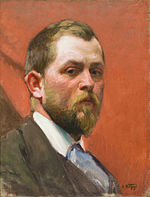Edward Henry Potthast
Edward Henry Potthast | |
|---|---|
 Edward Henry Potthast, Self-Portrait, ca. 1920–27 | |
| Born | Edward Henry Potthast June 10, 1857 |
| Died | 1927 |
| Nationality | American |
| Education | Académie Julian |
| Known for | Painting |
| Movement | American Impressionism |
| Awards |
|
Edward Henry Potthast (June 10, 1857 – March 9, 1927) was an American Impressionist painter. He is known for his paintings of people at leisure in Central Park, and on the beaches of New York and New England.[1]
Life and work
Edward Henry Potthast was born on June 10, 1857 in Cincinnati, Ohio to Henry Ignatz Potthast and Bernadine Scheiffers.[2] Starting in 1870 he studied art at the McMicken School in Cincinnati and in 1873 he started working at the Strobridge Lithography Company.[3] From June 10, 1879 to March 9, 1881,[citation needed] Potthast studied under Thomas Satterwhite Noble, a retired Confederate Army captain who had studied with Thomas Couture in Paris.[4] Potthast later studied at the Royal Academy in Munich with the American-born instructor Carl Marr. After returning to Cincinnati in 1885 he resumed his studies with Noble. In 1886, he departed for Paris, where he studied with Fernand Cormon. In 1895 he relocated to New York City and remained there until his death in 1927.[citation needed]
Until the age of thirty-nine Potthast earned a living as a lithographer. The purchase of one of his paintings by the Cincinnati Museum of Art may have encouraged him to abandon lithography for a career as a fine artist.[5] His paintings retained the subdued colors and strong contrasts of the Munich school until he adopted the Impressionist palette late in his career.[citation needed]
After his arrival in New York Potthast worked as a magazine illustrator, and exhibited regularly at the National Academy of Design, the Society of American Artists and the Salmagundi Club, winning numerous prizes. By 1908 he was installed in a studio in the Gainsborough Building. Thereafter he painted sun-saturated images of Central Park, New England landscapes, and the Long Island beach scenes for which he is best remembered.[6] His work is included in many major museums in the United States.[7]
Gallery
-
Edward Henry Potthast Coney Island, c. 1914
-
Edward Henry Potthast Summer day, Brighton Beach
-
Edward Henry Potthast A July Day, oil, 1914
-
Edward Henry Potthast Happy Days, oil on panel, c. 1910–1920
References
- ^ Orlando Museum
- ^ Jacobowitz, Arlene, Edward Henry Potthast: 1857-1927, NYC: The Chapellier Galleries, 1968, 4.
- ^ Vigue, Jordi (2004). Great Masters of American Art. New York: Watson-Guptill Publications. pp. 379. ISBN 0823021157.
- ^ Noble was best known for his portraits and genre paintings of the Old South. Pierce, Patricia Jobe, Marco Apollo, and Prescott S. Bush, Edward Henry Potthast: More Than One Man, Hingham: Pierce Galleries, Inc., 6.
- ^ Orlando Museum
- ^ Orlando Museum
- ^ "Edward Henry Potthast Museum Collections". Archived from the original on 2013-08-27. Retrieved 2010-03-25.
- Edward Henry Potthast, American Impressionist: Selections from the Gross Family Collection Retrieved 3-25-10
Further reading
- Jacobowitz, Arlene, Edward Henry Potthast: 1857-1927, New York City: The Chapellier Galleries, 1968
- Pierce, Patricia Jobe, Marco Apollo, and Prescott S. Bush. Edward Henry Potthast: More Than One Man, Hingham: Pierce Galleries, Inc., 2006, 158 pages
- Stula, Nancy with Nancy Noble. American Artists Abroad and their Inspiration, New London: Lyman Allyn Art Museum, 2004, 64 pages [1]
External links
- Edward Henry Potthast Biography: Hollis Taggart Galleries
- www.EdwardHenryPotthast.org 118 works by Edward Henry Potthast
- American paintings & historical prints from the Middendorf collection, an exhibition catalog from The Metropolitan Museum of Art (fully available online as PDF), which contains material on Potthast (no. 50)




